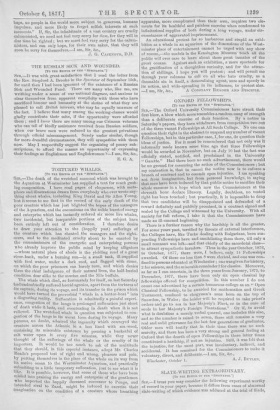DR. VAUGHA.N ON THE WAR.
[TO TIDI EDITOR OF Tlla "SPEOTATOR."]
Srn,—In the columns of one of your contemporaries, I observe ei brief notice of a sermon lately preached on a Sunday to an enor- mous congregation at the parish church, Doncaster, by the Rev. Dr. Vaughan. The following words, among others, are cited:— " We see two semi-barbarous races tearing each other to pieces, both in the name of the One God, one of the two on the pretext of religion, and in the name of Jesus Christ."
Had these words been uttered at some civic banquet, or been addressed by an M.P. to his constituents, I should not have thought of commenting upon them. But surely a church is a sacred place, and we of the clergy ought to try to speak words of charity to our hearers, a duty rendered all the more incumbent on those who, like Dr. Vaughan, possess a widespread and well- deserved influence.
I wish to ask, very seriously, if such language as that which I have quoted can be considered charitable. If a preacher urged that motives were mixed, that dreams of national aggrandisement might be blended with purer grounds of action, such a charge might, no doubt, be urged with great plausibility from time to time against the people of more than one country, including perhaps our own. But Dr. Vaughan seems to me—I shall be very glad if I have misunderstood him—to bring an accusation of unmixed hypocrisy against the whole of a great nation.
Now if I, in common with thousands of our countrymen, decline to believe the truth of this bitter, sweeping, and terrible accusation, it will be said that we are prejudiced. Be it so, for argument's sake. But at any rate, our prejudices, in this matter, do not run in the direction of uncharitableness. Further, we must ask, which of the two sets of prejudices (for we cannot honestly allow that they exist on one side only) will ultimately be found most consonant to a fair study of the facts of human. nature and of the character of the people of Russia, and most accordant with the Christian religion ? We do not desire a hasty answer ; we are content to " bide our time."
I must not take up your space with accumulation of evidence. But here is a sentence or two, out of many that might be selected from various quarters. I take it simply as one of the latest, from, a correspondent of the Times, whose letters from St. Petersburg. appeared in that journal on Tuesday, October 2 :—" Whatever may have been the secret aims of the Government in de- claring war, there can be no doubt that the great mass of the people were animated with the humane desire of assisting the cruelly oppressed Rayahs. I am far from imagining that this was the only motive, but it certainly was the principal one. A good many persons are in the habit of regarding the Russians as a cold, calculating, heartless set of people, who think of nothing but their own interests. This conception is utterly false. There is, per- liaps, no people in the world more subject to generous, humane impulses, and more likely to forget selfish interests at such moments." If, Sir, the inhabitants of a vast country are cruelly 'calumniated, we need not feel very sorry for them, for they will in
• due time be righted ; but we must feel very sorry for the calum- niators, and can only hope, for their own sakes, that they will soon be sorry for themselves.—' am, Sir, &a.,
J'. G. CAZENOVE, D.D.



































 Previous page
Previous page